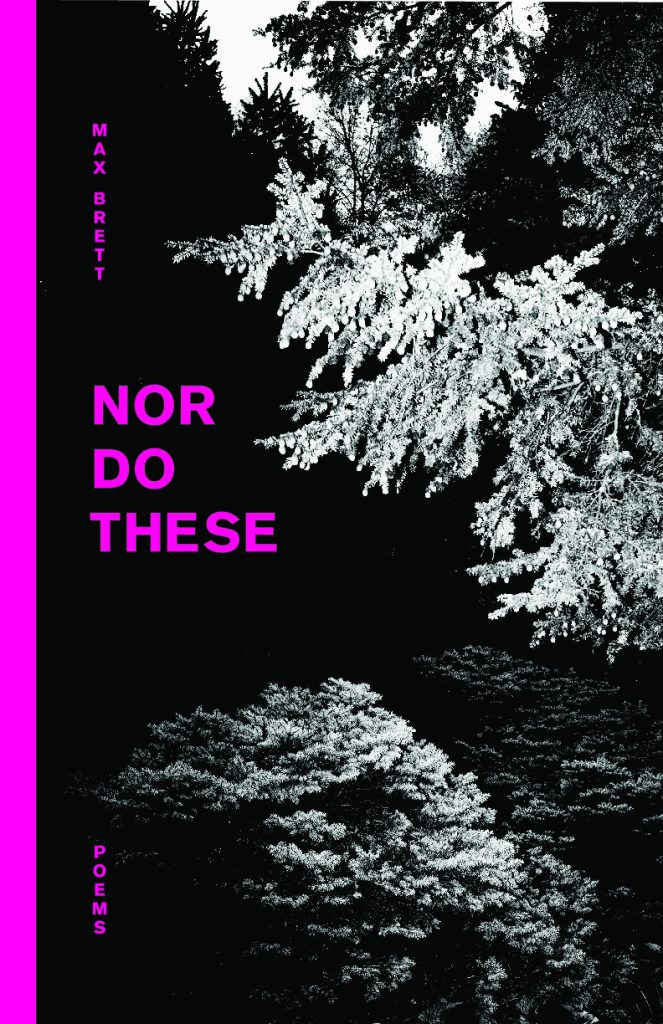 Editorial Assistant Erinn Batykefer sat down with author Max Brett to discuss his first book, Nor Do These. If you’re in New York, join us to hear Max read tonight, 7PM at Dixon Place.
Editorial Assistant Erinn Batykefer sat down with author Max Brett to discuss his first book, Nor Do These. If you’re in New York, join us to hear Max read tonight, 7PM at Dixon Place.
Nor Do These came out of a tandem exercise that quickly shed participants. It aims to address a series of obsessions, including the eroticism of accountancy, honed corporate strategy, dangerous unicorn hunts, the lives, phobias and phobia-related injuries of arguably obscure baseball players, and age and aging, among other things.
Erinn Batykefer: You’ve worked extensively in journalism– what’s the relationship between poetry and reportage?
Max Brett: Fourteen years in journalism isn’t so extensive.
Reportage in the alternate definition of a “factual presentation in a book” to me definitely applies to poetry by someone like Susan Howe, who is constantly excavating realities, constantly researching and presenting and curating, library cormorant that she is. I’m reading “The Bench-mark” now. The list could really go on and on but someone like Reinaldo Arenas is presenting his reality in Cuba through a poetry-reportage in a sort of essential way. It remains very difficult for nonfiction-y narratives like that to get out. Poetry can assume some techniques of reportage to whatever end.
EB: The Introduction to Nor Do These outlines a 30-day creative exercise that grew into this book. Is all of your creative work time-limited or deadline-driven?
MB: Keep in mind the exercise conceit might be made up.
In a very literal sense everyone is time-limited or deadline-driven, but in the sense I think is meant in the question, here, I do better when I’m given an assignment and constrained by a deadline. It has to do with a whole-body inability to decide on my own. Left to my own devices, I re-litigate and re-litigate decisions until the people around me lose their will to live. When I am alone, the hours fly by with the weighing of potential decisions. Constraints really come in handy. But this isn’t always the case.
EB: A number of theoretical physicists make cameos in Nor Do These. Do you have a favorite physicist story?
MB: One from “Bomb Power” by Garry Wills any other accounts isn’t a story or an anecdote so much as a brief idea about the sexual appeal of J. Robert Oppenheimer. He had blue, blue, blue eyes, devastatingly blue eyes, icy blue eyes that everyone found totally irresistible. A lot of people don’t know that “The Bluest Eye” is about Oppenheimer.
Theoretical physicists entered into the picture of the book much against my will, as theoretical physicists will do. They are a very transgressive bunch. I don’t agree with the old theoretical physicist maxim, “Only theoretical physicists like us are interesting.” This obviously excludes many other nodes of interest. Perhaps that perspective also comes from journalism.
EB: Why science + art?
MB: I had very (underscore very) minor cancerous growth on my temple and I went into surgery to remove it and Dr. Hooman Khorasani of Mount Sinai made a perfect small drawing of what he was going to cut out of my face first and the drawing developed as he cut and figured out what of the growth remained and after five passes under the knife he gave me the drawing and it’s one of my favorite drawings. Surgeons cut out that type of skin cancer bit by bit in progressively smaller bits and it’s reminiscent of an open-pit mine. Last year I had the opportunity to visit an open-pit mine in Belitung, Indonesia. This was after years of covering the mining sector, in which I visited no mines.
EB: “In a book of thirty-nine poems, the fortieth poem is the book.” How do you see Nor Do These as both collection and whole?
MB: Myopically.
My response might be straight from the amygdala because I don’t know enough and feel insecure I or might just restate the question in answer form, e.g., pieces deal with disparate subject matter like unicorn hunts and personified coffee makers, so they are different and stand on their own, but the conceit binds these pieces together, it was made too concurrently not to be linked, and thematically there are linkages.
EB: Is there a text you would want a reader to upload to their brain Matrix-style before reading Nor Do These?
MB: No. A Matrix-style upload is probably where reading is going and I don’t like the passive role that assigns the reader. And I don’t think any pre-reading is necessary for Nor Do These. Maybe some Adolfo Bioy Casares.
EB: If you could take [PANK] on a date where would you go? [PANK] loves you.
MB: I’ve been in love with [PANK] for months. It’s a lot of pressure—you only get one chance with [PANK]. Probably the Irish Hunger Memorial followed by a bottle of white wine in a public park, with lots of talking, followed by coffee and more talking, followed by more walking.
Max Brett covered policing and immigration with The Chicago Reporter and possible instances of wrongful conviction with the Medill Innocence Project. He helped launch an English-language newspaper in Mexico City. Max was the global sector head of mining with a subscription-based news service. At time of writing, Max works for a nongovernmental organization focused on corruption in resource-rich countries. Max studied journalism, visual art and religion at Northwestern University.
![[PANK]](https://pankmagazine.com/wp-content/themes/pank/assets/images/pank-logo-large.png)
